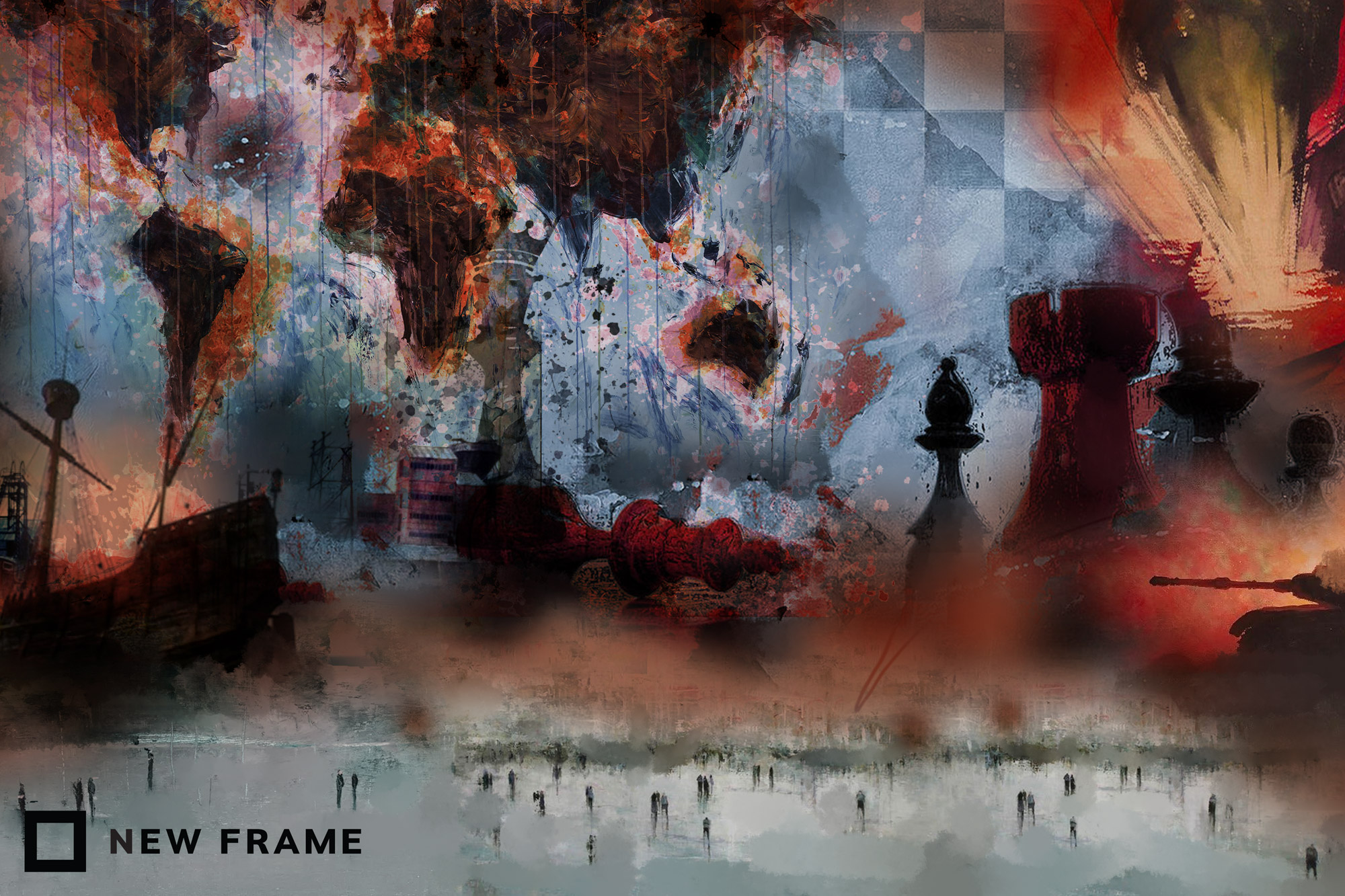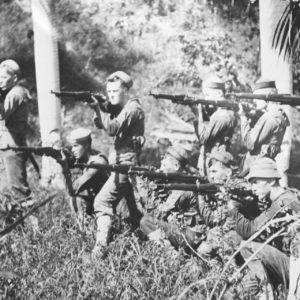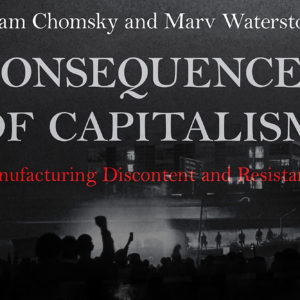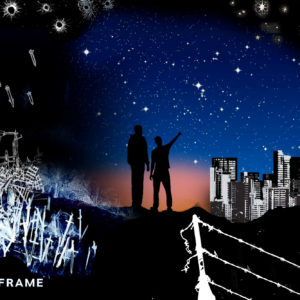The liberal order never loved us
Powerful actors in the South African public sphere assume that Western domination of the world is something virtuous, something to be uncritically defended. It is a deeply flawed world view.
Author:
18 March 2022

Now that the new Cold War instigated by the United States and its allies to contain Russia and China has turned all too hot in Ukraine, we are being told that the liberal order and the domination of the planet by the West – western Europe and its settler colonies – are under threat. This, we are told, sometimes implicitly and sometimes explicitly but always relentlessly, is a catastrophic prospect.
It is hardly surprising that this is the view of most of the media in the West. It is, though, striking that here in Africa, in the Global South, powerful actors in our media and in the elite public sphere more widely assume similar views, and assume them as common sense rather than as positions to be debated. More nuanced positions, including positions that are taken with the aim of placing African interests at the centre of our concerns, are often met with a mixture of disgust and outrage.
Europe, initially southern Europe, became a planetary power in 1492 when Christopher Columbus arrived in the Caribbean. The immediate consequence of this for the people of the Caribbean and the Americas was a holocaust – conquest, enslavement, genocide, enclosure and appropriation on a staggering scale. In Europe all this suffering, on a scale that remains beyond any comprehension, enabled the accumulation of wealth and power that entrenched its global domination so deeply that Europe, and its settler colonies, now led by the US, continue to assume both a right to rule the world and that its rule is in the interests of all humanity.
Related article:
From the middle of the 16th century onwards, the fabulous wealth extracted from the silver mines in Potosí, in what is now Bolivia, was central to the initial confirmation of Europe as a global power. The mines were worked by people enslaved in the Americas on such a massive scale that Potosí quickly became one of the largest cities in the world. As Uruguayan writer Eduardo Galeano wrote, “You could build a silver bridge from Potosí to Madrid from what was mined here – and one back with the bones of those that died taking it out.”
In the early 16th century the colonial powers in the Americas began to turn to Africa in their hunt for slaves. Over a period of 400 years, more than 12 million people survived the journey across the Atlantic and into hell.
Initially all this horror was justified in the name of religion through the idea that people who were not Christian were not fully human. This enabled Europe to see itself and its people as sacred, and the rest of the world and its people as profane. The means to legitimate the barbarism of Europe took on more secular forms in the 17th century and the invention of the idea of race, a fabrication first developed in the English colony of Virginia, began to replace religion as the legitimating fiction for genocide, enslavement and colonial occupation.
The logic of liberalism
The political ideology that emerged to justify the power of European elites at home and in the colonial world was liberalism. From the start it explicitly asserted that the rights it offered were not intended to be for all. It was not an oversight that the development of liberal rights in Europe and for Europeans – initially for elite men – was simultaneous with the devastation caused by European colonialism elsewhere.
As New Frame has noted before, when John Stuart Mill, one of the great liberal philosophers, wrote his famous essay On Liberty in 1859, he was very clear that “despotism is a legitimate mode of government in dealing with barbarians”. This was the logic of liberalism throughout the colonial era and it remains the logic of liberalism today.
Related article:
The “liberal order” celebrates its virtue while ascribing wildly different values to a life in Yemen and a life in Ukraine. It would, without hesitation, describe a state that treated white people as Israel treats Palestinians as fascist, yet Israel is said to be a democracy and is armed, funded and defended by the West.
The “liberal order” celebrates itself as democratic, yet its pretence of holding to democratic principles in international relations is farcical. Elected governments have routinely been slandered, encircled and deposed by the West, usually with the US in the lead, because they refuse to accept Western authority. The invasion of Iraq in 2003, a criminal act that took up to a million lives and left the country in ruins, was presented as a democratising mission. Coups, such as the one in Bolivia in 2019, are spoken of as advances for democracy. This language is accurately characterised as Orwellian.
Propaganda as common sense
We can only imagine the sort of language that would be used if a country outside of the sacred circle of liberalism attempted to bomb Western cities, dictate the economic policies of Western countries, sanction their leaders and overthrow their governments when they made tentative moves towards asserting some limited autonomy.
In the famous “propaganda model” developed by Edward S Herman and Noam Chomsky to explain how the corporate media works in the US, they said “the elite domination of the media and marginalisation of dissidents … occurs so naturally that media news people, frequently operating with complete integrity and goodwill, are able to convince themselves that they choose and interpret the news ‘objectively’ and on the basis of professional news values”.
Related article:
It is difficult to think of any major actor in the Western media for which a world view fundamentally structured by the idea of Western superiority is not so naturalised, so much a part of its common sense, that it is assumed to be “objective”. The degree to which this sense of superiority – of a right to rule – is entrenched as common sense is one sign among many others that the epoch in human history, the moment when a planetary history first came into being, inaugurated in 1492, is not yet over.
The Mandé Charter conceived in the Malian Empire in 1222 declared that “every human life is a life … no one life is superior to any other … Any wrong done unto a life requires reparation.” These sorts of ideas, explicitly universalised, are still present in some forms of contemporary political dissent. But that these forms of dissent are entirely marginal does not mean that a universal conception of the value of humanity should not be opposed to the long catastrophe for most of humanity that began in 1492. No form of oppression should be accepted as inevitable.
Shifting perspectives
It is one thing for the Western media to assume the moral superiority of the West, its right to rule and the sacred authority and value of the “liberal order”. But that this view is also often assumed in the elite public sphere in South Africa is worthy of careful consideration. What does it mean when an African country has a powerful internal force that assumes it is part of the West, that the West has a right to rule the planet, that the “liberal order” is an obviously good thing and that threats to it should be met with hysteria, slander and force rather than reason?
What does it mean when it is assumed that a unipolar world, one dominated by the US, is self-evidently better for all of humanity than a multipolar world? What does it mean when even taking these kinds of questions seriously is seen as deeply irrational and immoral?
Related article:
The liberal order was never for Africa. It was and remains, among other things, a mechanism to dominate Africa. Assuming the desirability of its permanence is a catastrophic failure of political judgement in both ethical and strategic terms. Those who assume we should remain in the epoch that began in 1492 are not our friends.
The question of what comes next is urgent, and as we know all too well from the horrors of all too many post-colonial regimes, history has no guaranteed arc towards justice. But this does not diminish the urgency of the need to think in world historical terms, to think of a just future beyond the continuing horrors of the period in human history that began in 1492.




